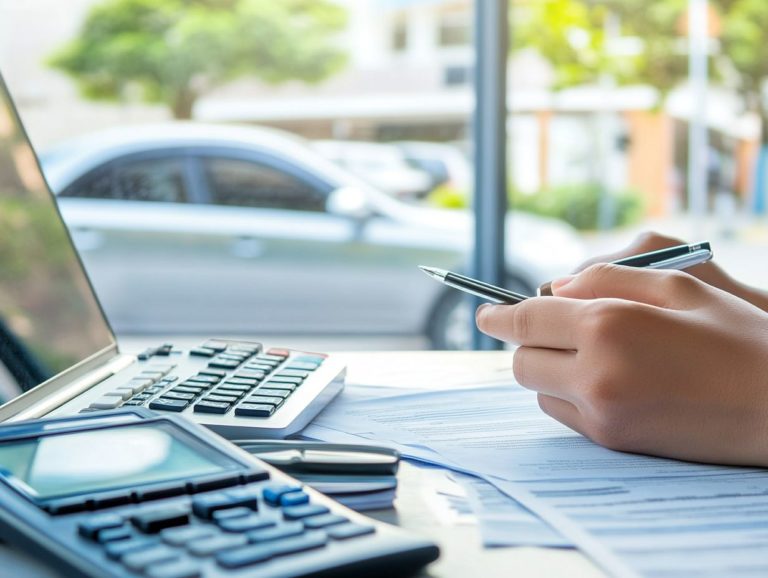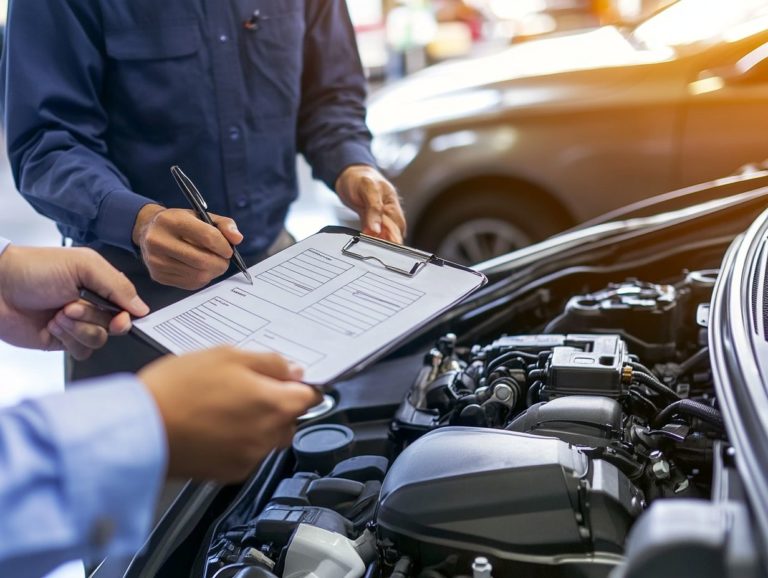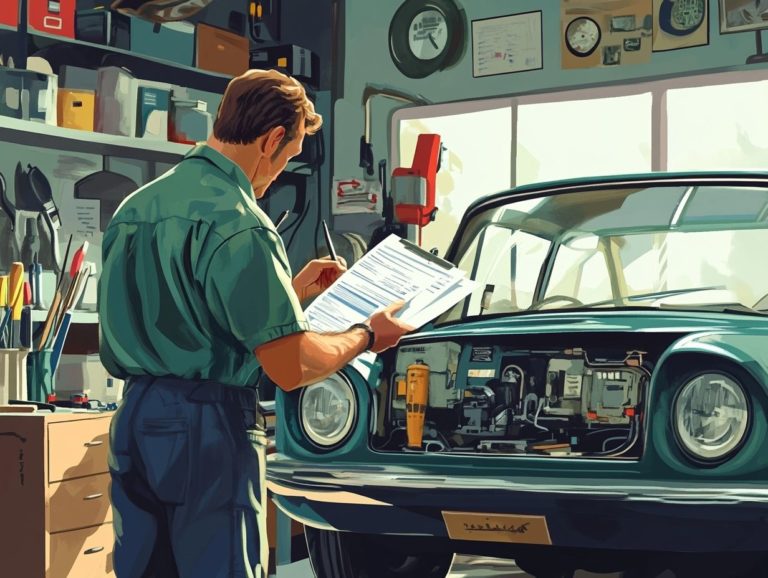How to Buy a Used Car with Bad Credit
Buying a used car can feel like an uphill battle, especially if you re dealing with bad credit. Navigating the intricacies of credit scores and financing options might seem overwhelming, but it doesn t have to be.
This guide will empower you with essential tips you’ll need to make the best car purchase: understanding your credit score and how it influences your purchase, exploring the advantages of opting for a used car, and outlining practical steps to enhance your credit.
You ll also discover tips for negotiating a fair deal. Whether you re working with a tight budget or facing challenges due to bad credit, there are resources available to support you at every stage of the journey.
Contents
- Key Takeaways for Buying a Used Car with Bad Credit:
- Understanding Your Credit Score
- Benefits of Buying a Used Car
- Challenges of Buying a Used Car with Bad Credit
- Steps to Take Before Buying a Used Car
- Where to Look for Used Cars
- Negotiating the Purchase
- Financing Options for Bad Credit
- Finalizing the Purchase
- Frequently Asked Questions
- Can I buy a used car with bad credit?
- What steps should I take when buying a used car with bad credit?
- Is it better to buy from a dealership or a private seller when I have bad credit?
- Do I need a co-signer to buy a used car with bad credit?
- What should I look for in a used car when I have bad credit?
- Can I improve my credit score while buying a used car with bad credit?
Key Takeaways for Buying a Used Car with Bad Credit:

- Understand your credit score and factors that affect it before buying a used car.
- Consider the benefits of buying a used car, such as cost savings and other advantages.
- Overcome challenges by improving your credit score, setting a realistic budget, and exploring alternative financing options.
Understanding Your Credit Score
Understanding your credit score is essential for securing favorable auto loans, particularly when you’re facing the challenges of bad credit. Your credit score serves as a numerical snapshot of your credit history, showcasing your ability to repay debts.
Agencies like Experian, TransUnion, and Equifax report your credit score. Various factors, such as credit inquiries, outstanding debts, and your payment history, play pivotal roles in shaping this score. These factors directly influence both loan approval and interest rates on auto loans.
Improving your credit score can enhance your prospects for better financing terms, lower interest rates, and a monthly payment that fits comfortably within your budget.
Factors that Affect Your Credit Score
Several factors significantly influence your credit score, including payment history, credit utilization, and the age of your credit history all of which you can monitor through your credit report.
Understanding how these elements interact is crucial for effective credit management. Your payment history accounts for about 35% of your overall score. Making timely payments can substantially enhance your financial standing.
Credit utilization the amount of credit you use compared to your total available credit should ideally remain below 30% to maintain a healthy score.
The age of your credit history contributes around 15% to your score. A longer, well-managed credit history can enhance your lendability, particularly when you’re seeking auto loans. Borrowers with scores above 700 typically secure better interest rates, underscoring the importance of these factors in your financial journey.
Benefits of Buying a Used Car
Buying a used car can save you a lot of money and offers a variety of benefits, making it an attractive option for those aiming to manage vehicle financing with finesse.
Used cars generally come with lower purchase prices compared to new vehicles. This translates to reduced down payments and more manageable monthly payments. This affordability often extends to insurance costs, as premiums for used cars tend to be lower.
By looking into the used car market, you can discover vehicles that hold their value well over time, ultimately presenting a more economical choice for your budget.
Cost Savings and Other Advantages
Cost savings are a primary reason to choose a used car, as they often come with lower interest rates and more reasonable pricing compared to new vehicles.
When you purchase a pre-owned vehicle, you avoid the steep depreciation that new cars face as soon as they leave the lot. You also unlock more favorable financing options. Lenders typically offer reduced interest rates on used cars because they tend to have a lower overall value, resulting in lower monthly payments and overall loan costs.
For example, compact models like the Honda Civic or Ford Focus deliver exceptional reliability and fuel efficiency while remaining budget-friendly. These vehicles generally hold their value well, making them ideal choices for those who seek affordability without compromising on quality.
Challenges of Buying a Used Car with Bad Credit
Purchasing a used car with bad credit comes with its own set of challenges that can significantly affect your experience. The first hurdle is loan approval, followed closely by the interest rates you may be offered. To better prepare for these issues, you can learn how to navigate financing a used car purchase. Both of these factors can drive up the overall cost of financing.
With a poor credit history, you’ll likely face limited financing options, higher monthly payments, and potentially unfavorable loan terms. This can feel overwhelming. Therefore, it is essential to shop around for better rates and understand how to choose the right used car. Lenders may impose stricter criteria that could impact your ability to secure the financing you need for your vehicle.
Potential Roadblocks and Limitations
Navigating the world of used car financing can present significant roadblocks for those with bad credit. It’s important to understand what to know about used car financing, as you may face higher interest rates and less favorable loan terms, making the process even more challenging.
These obstacles can become more pronounced due to limited options. Many lenders tend to shy away from borrowers with poor credit histories, leading to a frustrating experience. You might feel pressured to accept financing solutions that come with hefty costs over time.
To effectively tackle these challenges, seek pre-approval from various lenders. This can give you valuable insight into the specific terms and rates you can expect based on your credit situation.
You should also take steps to improve your credit score. Making timely payments or reducing outstanding debt can significantly enhance your chances of securing a better deal down the road.
Steps to Take Before Buying a Used Car
Ready to find your dream used car? Start by taking these essential steps. First, improve your credit score and set a realistic budget to pave the way for a smoother buying experience, including exploring various used car financing options.
Improving Your Credit Score
Improving your credit score is crucial for anyone struggling with bad credit. It can unlock better financing options and more favorable interest rates on loans.
By taking proactive measures, you can enhance your financial standing and set the stage for future investments. One essential strategy is to regularly monitor your credit reports. Regularly checking your credit reports can help you find and fix errors that could be holding you back.
Managing how much credit you use compared to your limits is also key. Keeping your balances low can have a significant positive impact on your score. Additionally, it’s wise to minimize credit inquiries, as too many applications for new credit can raise red flags for lenders.
By following these actionable tips, anyone looking to rebuild their credit profile can expect to see tangible improvements in no time.
Setting a Realistic Budget
Setting a realistic budget is essential in your car-buying journey. It encompasses key factors like down payments, monthly payments, and the overall costs of financing the vehicle.
As you embark on this process, take a moment to evaluate your financial situation. Determine how much you can comfortably allocate toward a down payment without overextending yourself. By understanding your budget, you can calculate the initial down payment and the subsequent monthly payments that align with your overall financial plan.
This mindful approach ensures you account for the total loan costs, including interest rates and any hidden fees. This ultimately protects your financial future and paves the way for a more rewarding ownership experience.
Where to Look for Used Cars
When you embark on the journey of finding a used car, a wealth of avenues awaits your exploration. From online marketplaces and traditional dealerships to specialized platforms like Carvana and New Roads, each option is designed to simplify your search and enhance your buying experience.
Start your journey today and unlock the keys to your next car!
Online Marketplaces and Dealerships
Online marketplaces and dealerships each have distinct advantages in your search for the perfect used car. They help you effectively compare prices and financing options.
Online marketplaces let you explore a vast selection from your home. Traditional dealerships provide the immediate satisfaction of in-person inspections and test drives.
Keep in mind that financing options can vary greatly between these two choices. Marketplaces show a variety of lenders and competitive interest rates, so you can evaluate your options thoroughly.
Dealerships may offer a more personalized experience and financing deals tailored to their inventory. As you look closely at interest rates, consider factors like loan details and any hidden fees.
Negotiating the Purchase

Negotiating the purchase of a used car is essential to securing a fair deal that fits your budget.
Tips for Getting a Fair Deal
To secure a fair deal, you need thorough research and sharp negotiation skills. Understanding the factors that influence car valuations is vital.
Prices can vary greatly based on make, model, condition, and mileage. Use resources like Kelley Blue Book or Edmunds to assess average market values; this knowledge will strengthen your negotiations.
Prepare a checklist of comparable listings to support your discussions. Exploring pre-approved loans gives you an edge, ensuring your budget aligns with available options.
Financing Options for Bad Credit
Navigating financing options with bad credit can be overwhelming. Familiarizing yourself with choices like credit unions and online lenders can simplify the process.
Understanding these options helps you make informed decisions that fit your financial needs.
Exploring Alternative Financing Options
Considering alternative financing options is important if you have bad credit. Platforms like myAutoloan can provide viable solutions.
These methods can be a lifeline when traditional banking barriers seem too high. Peer-to-peer lending lets you connect directly with individual lenders for more favorable terms.
Specialized loan services meet specific needs, whether it s auto financing or personal loans. Exploring these alternatives can reveal the financial support you need to improve your credit standing.
Finalizing the Purchase
Finalizing the purchase of a used car is a pivotal moment in your buying journey. This step helps make sure everything goes smoothly, meeting the criteria for loan approval and auto insurance.
Ready to buy a used car? Let’s make this process smooth and hassle-free!
Ensuring a smooth transaction when purchasing a used car requires careful attention, especially regarding paperwork and securing necessary loan approvals to finalize the deal.
Gather all pertinent documentation, such as the bill of sale, title transfer, and any service history records. These elements collectively confirm the car’s ownership and condition.
Obtaining loan approval before commitments simplifies the financing process and helps alleviate potential delays during the transaction. With loan confirmations in hand, you can gauge your budget and the terms involved, enabling you to negotiate better deals and avoid surprises later.
Stay organized and informed. This is key to a smooth buying experience.
Frequently Asked Questions

Got questions about buying a used car with bad credit? Here are some answers!
Can I buy a used car with bad credit?
Yes, you can buy a used car with bad credit. However, it may require extra effort and research to find a lender willing to work with you, particularly by understanding how to secure a used car loan.
What steps should I take when buying a used car with bad credit?
First, check your credit score and gather necessary documents such as proof of income and identification. Then, research lenders who offer loans to individuals with bad credit and compare their terms and interest rates.
Is it better to buy from a dealership or a private seller when I have bad credit?
Buying from a dealership may be easier as they often have in-house financing options. However, private sellers may offer lower prices, so weigh your options carefully.
Do I need a co-signer to buy a used car with bad credit?
A co-signer may increase your chances of getting a loan with better terms, but it’s not always necessary. Some lenders may offer loans to individuals with bad credit without a co-signer.
What should I look for in a used car when I have bad credit?
Look for a reliable and affordable vehicle. Consider factors such as mileage, maintenance history, and potential future repair costs.
Can I improve my credit score while buying a used car with bad credit?
Yes, making timely payments on your car loan can help improve your credit score over time. This can also make it easier for you to secure loans with better terms in the future.







